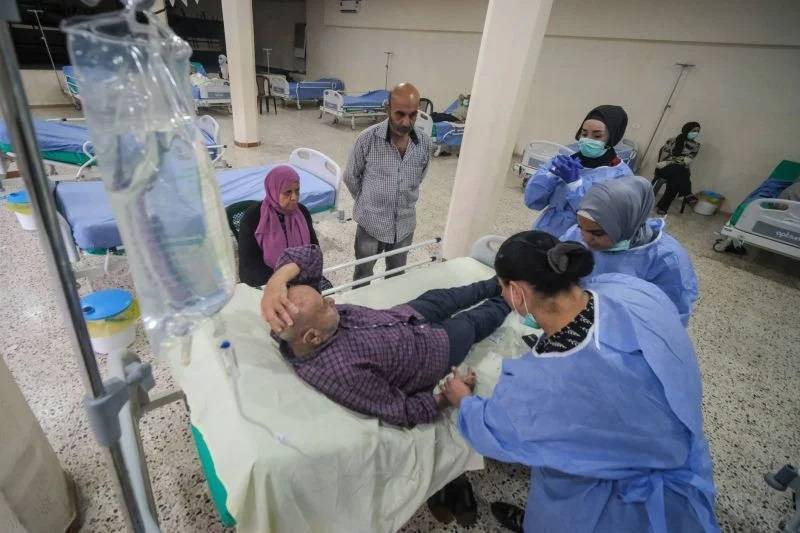
A man receives treatment for cholera in Akkar in Oct. 2022. (João Sousa/L'Orient Today)
Want to get the Morning Brief by email? Click here to sign up.
Villages in the Sour and Bint Jbeil districts of southern Lebanon faced a suspension of state water supply yesterday due to a strike by employees and on-demand workers with the South Lebanon Water Authority. The water authority’s employees suspended work at pumping stations in Batouliyeh, Kafra and Siddiqine to demand higher salaries and transport allowances, causing water cuts in the two districts. Several sectors of Lebanon's public administration have staged strikes during the country's ongoing economic crisis. Shortages of state electricity or fuel for generators previously caused water pumping stations to go offline, interrupting running water for regions across Lebanon. “[Lebanese] authorities must imperatively carry out the necessary water-related reforms,” United Nations International Children's Emergency Fund representative Edouard Beigbeder told L’Orient Today last November amid a sharp rise in cholera infections — which spread faster in the absence of adequate water infrastructure.
Insurance companies are expected to increase customer dues and fees paid to doctors, the president of the Association of Insurance Companies in Lebanon (ACAL), Assaad Mirza, told L'Orient Today. Mirza said he expects upcoming discussions between the ACAL and the Order of Physicians to finalize an increase to new insurance policies premiums by 10 percent and a 50 percent raise to the fees paid to doctors — which were set to be announced yesterday. The increase to doctors’ fees will not impact what insurers charge patients, Mirza said, but could increase the cost patients pay out of pocket. The president of the private hospitals union, Haroun Sleiman, said his union is also negotiating with the ACAL to demand a 40 percent price increase for services covered by insurance. In 2019, at the onset of the country’s economic crisis, insurance companies in Lebanon recorded their first year of losses since 2007. As of last March, more than half of Lebanon’s population was not formally covered by public or private health insurance — which, following the lira’s depreciation, incurred rising costs for policyholders and led to “dubious practices” by private insurers.
“Numbers show, without a doubt, that the banks have no liquidity,” said Association of Banks in Lebanon Secretary General Fadi Khalaf in an open letter sharing his own “opinion and personal analysis.” Khalaf mentioned $86.6 billion deposited at Lebanon's central bank as of mid-February, and a net negative position with correspondent banks of $204 million as of Jan. 31, 2023. Banks remained open this week, extending the suspension of an open-ended strike. Commercial banks have imposed informal capital controls on depositors’ foreign currency funds since the onset of the economic crisis in 2019. In a November report, the World Bank dubbed Lebanon’s financial losses “too big to bail [out],” and called instead for a bail-in solution that would convert commercial bank deposits above a certain threshold into equity in the banks — a proposal vehemently rejected by most bank owners.
The municipality of Majidieh-Mari, in South Lebanon's Hasbaya district, called for the discriminatory confinement of Syrian refugees in the area to curb the spread of cholera after a dozen cases of food poisoning symptoms and one confirmed cholera case, local mayor Youssef Fayad said. However, the last Health Ministry-confirmed case of cholera in Lebanon was on Jan. 5, more than two months ago. No new cases have been reported by the ministry in recent days. The municipality urged residents of surrounding villages to “confine themselves and avoid Syrian camps in the vicinity,” pending the administration of cholera tests by the Health Ministry. Following the recording of Lebanon’s first cholera case in nearly 30 years late last year, health authorities’ interventions curtailed the disease’s spread. Cholera has since claimed 23 lives in Lebanon — with the last death recorded in October — while the number of confirmed cases reached 671. This is not the first time Lebanese officials have implemented discriminatory measures against foreigners, including Syrian refugees. Authorities turn a blind eye or encourage such practices, which have no basis in Lebanese law and are illegal under international law.
In case you missed it, here’s our must-read article from yesterday: “The loving touch of analog things”
Compiled by Abbas Mahfouz